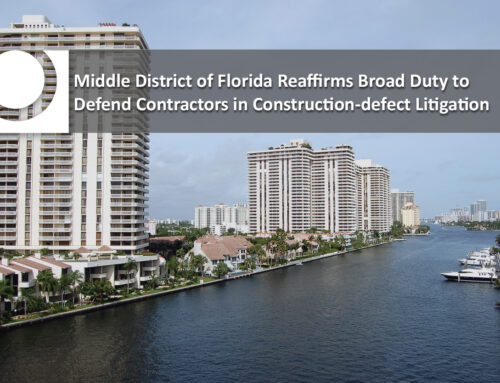A California appellate court recently handed an insurer a nasty defeat in a case involving some pretty sharp elbows by the insurer during the adjustment of a property-loss claim. In Stephens & Stephens XII, LLC v. Fireman’s Fund Ins. Co. (Nov. 24, 2014), the insured owned a warehouse that burglars had heavily damaged, including stripping wiring and electrical components from the building. For several years after the loss, the insured and insurer disputed the value of the covered “replacement cost” to fully repair the damages to the building (the insurer suspected that much of the damage occurred in the month before two burglars were caught in the act, which was only three days after the insurer’s coverage had started).
At trial, the jury found in the insured’s favor as to the timing of the loss, awarded a little over $2.1 million as the value of the “replacement cost” coverage. But the insurer convinced the judge to enter a judgment ignoring the jury’s determination because the insured had not complied with the policy’s requirement to first repair or replace the property before the insurer would pay a dime of those costs.
This trial victory was short-lived. On appeal, the appellate court rejected the insurer’s argument that payment could be held hostage to requiring the insured to come up with the repair money before being reimbursed, noting that payment of an “actual cost” claim (that is, the value of the loss minus depreciation) before repairs begin usually acts like “seed money” to get the ball rolling on repairs. The insured in this case did not want, and did not make, this limited claim as an initial step.
In a laudable nod to questions about fairness and bargaining position, the court noted that an insured without deep pockets would face a difficult task to convince a lender to finance repairs as long as the insurer refused to acknowledge coverage for a loss. Accordingly, the court refused to require strict adherence to the policy requirements, holding that the insured was entitled to a “conditional judgment” that obligated the insurer to pay after repairs were completed: “When an insurer’s decision to decline coverage materially hinders an insured from repairing damaged property, procedural obstacles to obtaining the replacement-cost value should be excused.”
But this victory against the insurer’s attempt to starve the insured into victory was not the end of the insurer’s troubles. In an unpublished part of the opinion, the court also upheld the jury’s award for the insured’s “lost rent” for a 44-month period, including the years-long delay in repairs caused by the insurer’s wrongful denial of coverage. This added another $2.1 million to the insured’s recovery — and a stinging reminder to insurers that courts will not tolerate unfair leverage during negotiations with insureds over the value of a loss.
Opinion reprinted from WestlawNext with permission of Thomson Reuters. If you wish to check the currency of this case by using KeyCite on WestlawNext, please visit www.next.westlaw.com.



